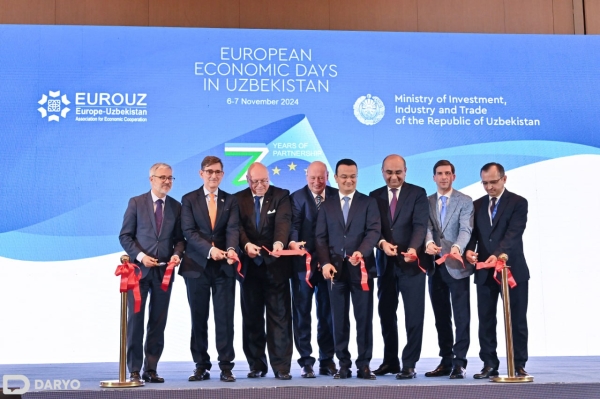The European Economic Days in Tashkent on November 6 marked the official launch of the Benelux Chamber of Commerce in Uzbekistan, a significant step in enhancing collaboration between Belgium, the Netherlands, Luxembourg, and Uzbekistan. Hosted by the European-Uzbek Association for Economic Cooperation (EUROUZ), the event brought together ambassadors from all three Benelux countries, who highlighted the strategic and historical ties that shape this partnership.

Belgium’s Vision: Building on Shared History and Reviving the Silk Road
His Excellency Henri Vantieghem, Ambassador of Belgium to Uzbekistan, reflected on the origins of the Benelux Union and the potential for Uzbekistan to follow a similar path. “Benelux is a unique alliance, forged during WWII when our governments were in exile. This cooperation allowed us to emerge stronger despite being surrounded by larger powers. Uzbekistan, surrounded by great powers, might find our journey relevant,” Vantieghem shared.
He emphasized the importance of the Trans-Caspian trade route as a modern Silk Road. “The route through the Red Sea has become less viable due to high insurance and environmental concerns. We need to reactivate the Silk Road, and I hope this partnership will bring us closer to that goal,” he added, stressing the shared commitment of the Benelux nations and the European Union to sustainable, overland trade routes connecting Europe and Central Asia.
The Netherlands: From Maritime Power to Central Asia Partner
Dutch Ambassador Nico Schermers highlighted the shift in Dutch foreign trade, with Uzbekistan now emerging as a key partner. “The Dutch were seafarers, exploring routes around Africa. Uzbekistan, being landlocked, was out of our reach. But that is changing,” he remarked.
The establishment of the Benelux Chamber of Commerce marks a significant pivot for the Netherlands, as the nation now seeks closer ties with Central Asia. “Through the Chamber, we’re taking a first step towards meaningful engagement with Uzbekistan. We’ll work within the Benelux spirit and alongside our European partners to foster economic ties,” Schermers added, stressing the Chamber’s role as a bridge for Dutch and European businesses to engage with Uzbekistan’s rapidly growing economy.
Luxembourg: Small Nation, Big Commitments
Representing Luxembourg, Ambassador Thomas Reisen shared the unique perspective of the “Lux” in Benelux, saying, “We may be the smallest of the three, but our size has always encouraged us to join forces with others.” He announced that he would soon present his credentials as Luxembourg’s first non-resident ambassador to Uzbekistan, a significant step toward fostering bilateral relations.
“Until now, Luxembourg has had limited bilateral relations with Uzbekistan, but this inauguration is the beginning of a more dynamic partnership. By the end of my mandate, I hope to see the Chamber thriving and enhancing cooperation between our three countries and Uzbekistan,” he stated, underscoring Luxembourg’s commitment to this new chapter of partnership.
The Broader Impact: A Sign of Uzbekistan’s Success
Pierre-Paul Antheunissen, Director General of EDF Central Asia, underscored Uzbekistan’s growing appeal to foreign investors, using the proliferation of business chambers as a measure of success.
“If there is an indicator to show the success of Uzbekistan in attracting foreign investors, I think the number and the vitality of business organizations and Chambers of Commerce would be a very good one,” he observed.
Reflecting on the recent establishment of the French Chamber of Commerce, he noted, “To create a chamber, you need a critical mass of companies… just to give you an idea of the vitality, and I think this shows the great interest that Uzbekistan has succeeded in generating.”
This Chamber joins others from France, Germany, and Italy in Tashkent, highlighting the international business community’s commitment to Uzbekistan.
The Launch: A Platform for Sustainable Growth and New Trade Routes
The launch of the Benelux Chamber of Commerce shows a commitment among Belgium, the Netherlands, and Luxembourg to support Uzbekistan’s economic growth while promoting sustainable trade practices. Each ambassador presented a unique perspective: Vantieghem’s historical context and call to revive the Silk Road, Schermers’ enthusiasm for bridging geographic and cultural divides, and Reisen’s commitment to fostering Luxembourg-Uzbekistan ties.
The new Benelux Chamber of Commerce will complement EU-Central Asia cooperation, with the shared goal of supporting Uzbekistan’s integration into global trade networks. As Ambassador Reisen remarked, “This Chamber is just the beginning. We have much to accomplish together.”




